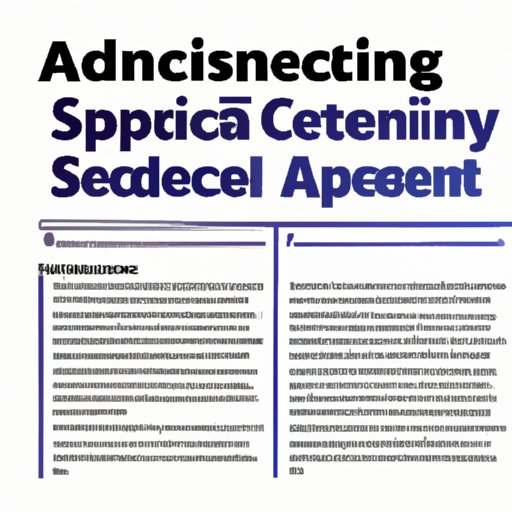Introduction
An applied behavioral science degree provides students with the knowledge and skills necessary to pursue careers in fields such as psychology, social work, and counseling. This type of degree program focuses on understanding and applying psychological theories and principles to improve the lives of individuals and communities. By studying topics such as human behavior, group dynamics, and communication, graduates can gain the skills needed to help others and make a positive impact in their community.
Overview of an Applied Behavioral Science Degree
An applied behavioral science degree is an interdisciplinary field that combines elements from the social sciences, including psychology, sociology, anthropology, and political science. Students enrolled in these programs learn how to analyze and interpret data, develop research plans, and apply theoretical models to real-world settings. In addition, they gain an understanding of ethical considerations when working with people or groups. Graduates of applied behavioral science degree programs are prepared for a variety of career paths, including mental health counseling, social work, and research.
Benefits of Pursuing an Applied Behavioral Science Degree
An applied behavioral science degree offers numerous advantages for students. One benefit is that it allows you to gain a comprehensive understanding of human behavior, which is beneficial for those considering a career in psychology, social work, or counseling. Additionally, the degree provides a solid foundation for those interested in research, as it equips graduates with the skills needed to conduct scientific investigations and analyze data. Finally, the degree can provide a stepping stone for those who want to pursue higher education in fields such as psychology, social work, or counseling.

Career Opportunities with an Applied Behavioral Science Degree
An applied behavioral science degree can lead to many different career paths. Depending on the type of degree program you pursue, you may be able to specialize in a particular field such as mental health counseling, social work, research, or policy analysis. Additionally, the degree can open up opportunities in fields such as public health, education, and business.

Types of Careers in Applied Behavioral Science
Graduates of an applied behavioral science degree program can pursue a variety of career paths. Mental health counselors use psychotherapy to help people manage mental health issues and improve their overall wellbeing. Social workers assist individuals and families in need by providing services such as crisis intervention and substance abuse counseling. Research professionals conduct studies to better understand human behavior and develop effective interventions. Policy analysts use their knowledge of social sciences to inform government policies and regulations.
Job Outlook for Applied Behavioral Science Professionals
The job outlook for applied behavioral science professionals is promising. According to the Bureau of Labor Statistics, employment of mental health counselors is projected to grow 22% between 2019 and 2029, much faster than the average for all occupations. Similarly, employment of social workers is expected to grow 11%, while jobs in research are projected to increase 6%. These trends suggest that there will be plenty of opportunities for graduates of applied behavioral science degree programs.

Sample Curriculum of an Applied Behavioral Science Degree Program
An applied behavioral science degree program typically includes both core courses and elective courses. Core courses cover topics such as research methods, human development, ethics in the helping professions, and psychotherapy. Electives may include courses such as abnormal psychology, social work practice, and family counseling. Additionally, some programs allow students to choose an area of specialization, such as mental health counseling or social work.

Exploring Financial Aid Options for an Applied Behavioral Science Degree
Pursuing an applied behavioral science degree can be expensive, but there are several financial aid options available. Scholarships and grants are forms of aid that do not need to be repaid, while loans must be repaid with interest. Work-study programs allow students to earn money to help pay for their education by working part-time at approved employers. Additionally, some schools offer special discounts for students who are members of certain organizations or meet other criteria.
Conclusion
An applied behavioral science degree provides graduates with the knowledge and skills needed to pursue careers in fields such as mental health counseling, social work, and research. The degree also offers a variety of benefits, including the ability to specialize in an area of interest and the potential for higher earning potential. Additionally, there are several financial aid options available to help make the degree more affordable. For those looking to make a difference in their community, an applied behavioral science degree is a great option.
(Note: Is this article not meeting your expectations? Do you have knowledge or insights to share? Unlock new opportunities and expand your reach by joining our authors team. Click Registration to join us and share your expertise with our readers.)
